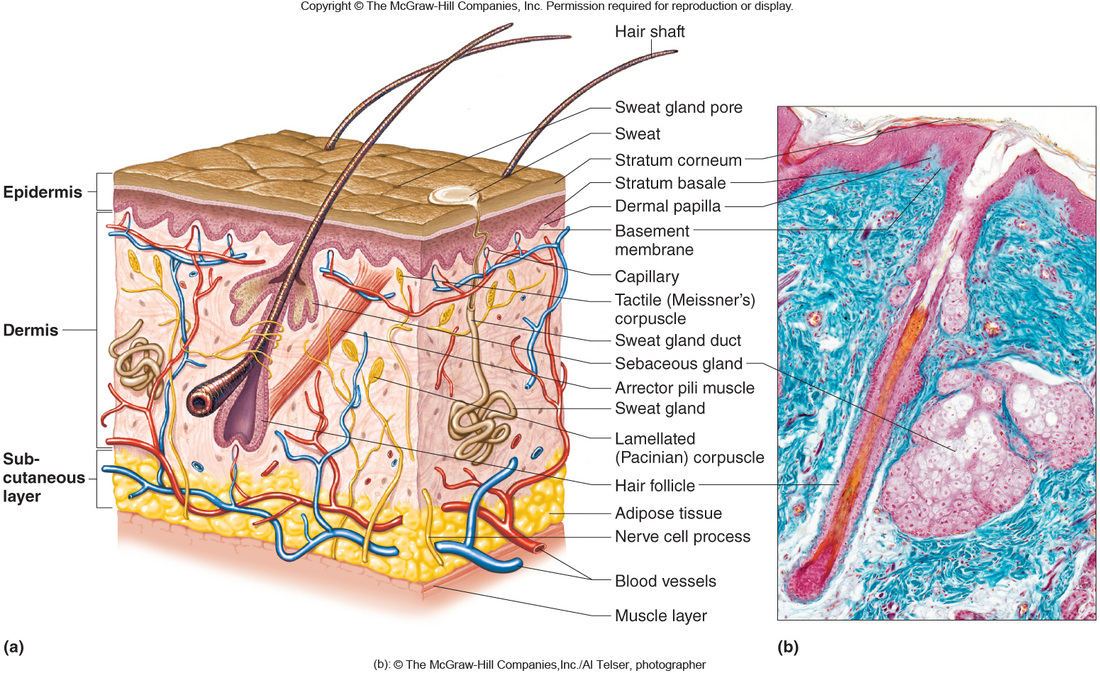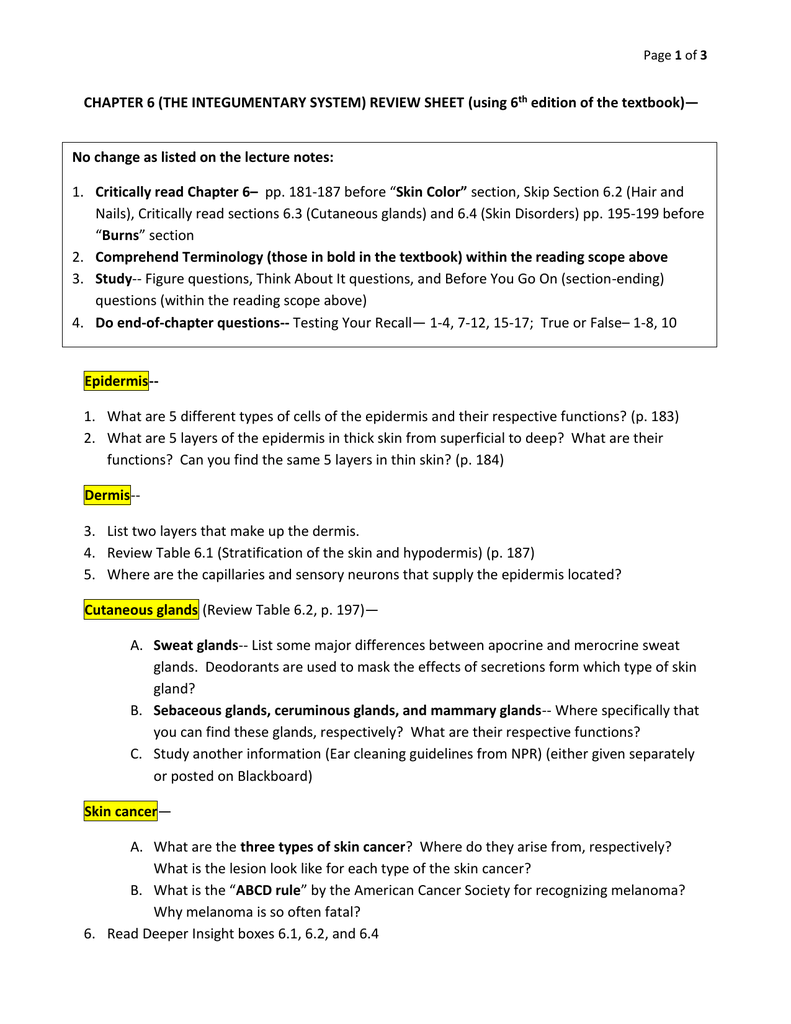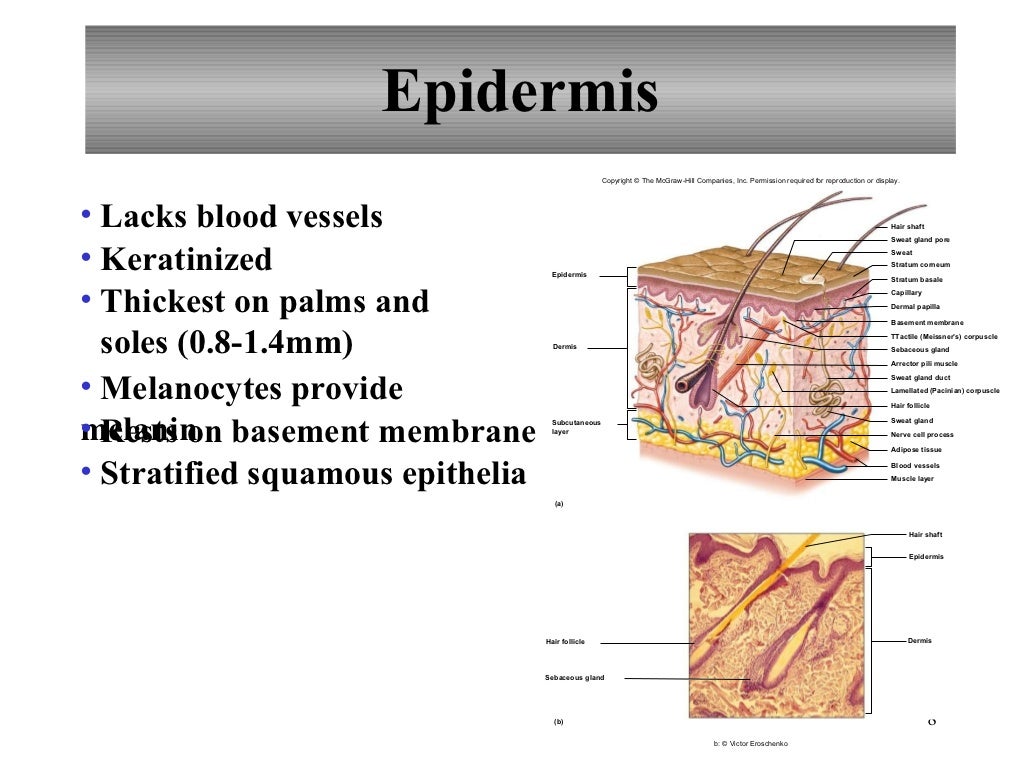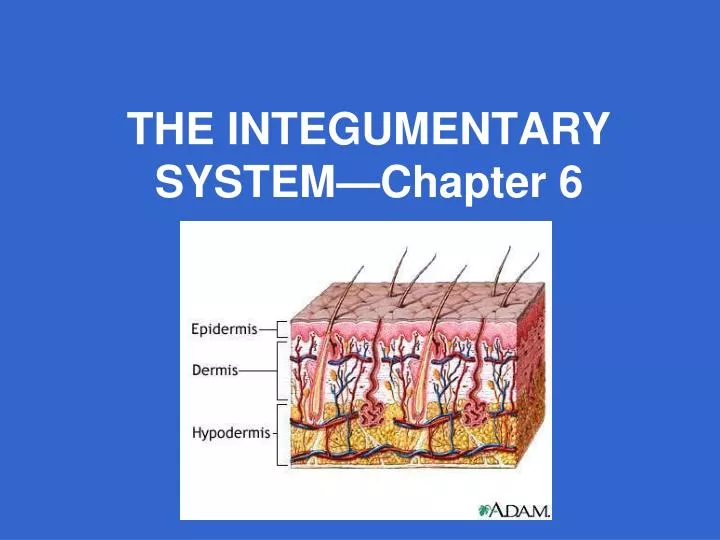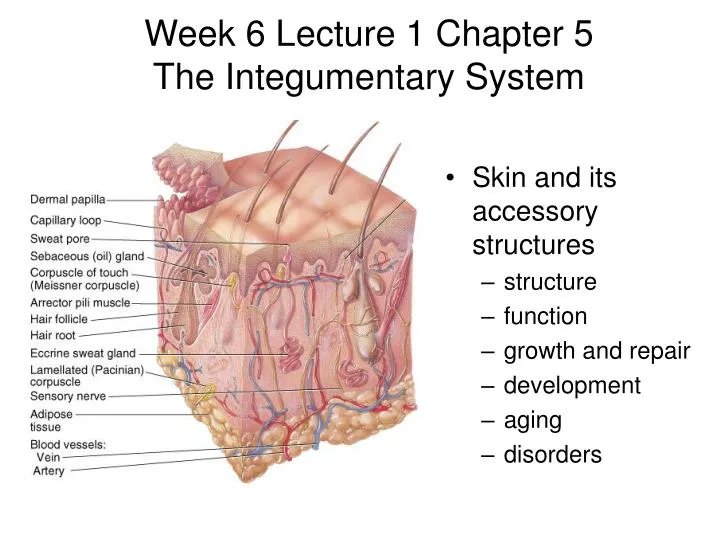Chapter 6 Integumentary System
Chapter 6 Integumentary System - Epidermis and dermis only hairs called _________ shield the eyes from windblown debris with a quick blink. Your integumentary system is an organ that consists of a few main structures: The first line of defense for the body is the. Outer layer is the epidermis and inner l ayer is the dermis. Inner layer of the skin that. Largest organ of the human. Our skin, called the integument is a durable protective covering of our body largest organ. Web chapter activities choose a chapter chapter 1 chapter 2 chapter 3 chapter 4 chapter 5 chapter 6 chapter 7 chapter 8 chapter 9 chapter 10 chapter 11 chapter 12 chapter 13 chapter 14 chapter 15 chapter 16 chapter 17 chapter 18 chapter 19 chapter 20 chapter 21 chapter 22 chapter 23 chapter. Terminal hair the skin is composed of the: Eyelashes identify the components of the.
Web which glands secrete oil or sebum for hair and skin. Your integumentary system is an organ that consists of a few main structures: Is the largest system of the body. Epidermis and dermis only hairs called _________ shield the eyes from windblown debris with a quick blink. Regulation of body temperature 3. Integumentary system in this chapter: Web the skin and its accessory structures (h, nails, glands, sensory receptors) make up the integumentary system. Click the card to flip 👆 1. Contains 2 layers epithelial tissue ov erlying connective tissue. 16% of body weight 1 to 2 m2 in.
Largest organ of the human. Web integumentary system its composed of several tissue types, maintains homeostasis, ha protective covering, retards water loss, regulated body temp, houses sensory receptors, contains immune system cells,. Click the card to flip 👆 1 / 43 flashcards learn test. Web chapter activities choose a chapter chapter 1 chapter 2 chapter 3 chapter 4 chapter 5 chapter 6 chapter 7 chapter 8 chapter 9 chapter 10 chapter 11 chapter 12 chapter 13 chapter 14 chapter 15 chapter 16 chapter 17 chapter 18 chapter 19 chapter 20 chapter 21 chapter 22 chapter 23 chapter. Web integumentary system chapter 6 anatomy and physiology lecture integumentary system. Web which glands secrete oil or sebum for hair and skin. Web chapter 6 the integumentary system the organs of the integumentary system include the skin and its accessory structures including hair, nails, and glands, as well as blood vessels, muscles and nerves. Contains 2 layers epithelial tissue ov erlying connective tissue. It contains your skin, hair, nails, and several glands. Web policy what makes up the integumentary system?
Integumentary System Worksheet Answer Key worksheet
Click the card to flip 👆 1. Your integumentary system is an organ that consists of a few main structures: Web policy what makes up the integumentary system? Web the skin and accessory structures perform a variety of essential functions, such as protecting the body from invasion by microorganisms, chemicals, and other environmental factors; Integumentary system 5.0 (1 review) what.
chapter 6 integumentary system
Web integumentary system chapter 6 anatomy and physiology lecture integumentary system. Contains 2 layers epithelial tissue ov erlying connective tissue. It contains your skin, hair, nails, and several glands. Web the integumentary system is one of the main protective systems of the human body. Web biology anatomy chapter 6:
35 Label Integumentary System Labels 2021
Integumentary system in this chapter: Blood testing lab (lab 49) clinical terms; Web chapter activities choose a chapter chapter 1 chapter 2 chapter 3 chapter 4 chapter 5 chapter 6 chapter 7 chapter 8 chapter 9 chapter 10 chapter 11 chapter 12 chapter 13 chapter 14 chapter 15 chapter 16 chapter 17 chapter 18 chapter 19 chapter 20 chapter 21.
CHAPTER 6 (THE INTEGUMENTARY SYSTEM) REVIEW SHEET (using 6
Largest organ of the human. 16% of body weight 1 to 2 m2 in. Integumentary system 5.0 (1 review) what structures make up the integumentary system? Web integumentary system chapter 6 anatomy and physiology lecture integumentary system. Click the card to flip 👆 1 / 43 flashcards learn test.
Chapter 6 integumentary system
Eyelashes identify the components of the. Web chapter activities choose a chapter chapter 1 chapter 2 chapter 3 chapter 4 chapter 5 chapter 6 chapter 7 chapter 8 chapter 9 chapter 10 chapter 11 chapter 12 chapter 13 chapter 14 chapter 15 chapter 16 chapter 17 chapter 18 chapter 19 chapter 20 chapter 21 chapter 22 chapter 23 chapter. Web.
Chapter 6 integumentary system
Muscle associated wirh hair follocles. Our skin, called the integument is a durable protective covering of our body largest organ. Web biology anatomy chapter 6: The first line of defense for the body is the. Largest organ of the human.
chapter 6 integumentary system Crossword WordMint
Web 1 / 112 flashcards learn test match created by bonnie_pendergrass3teacher terms in this set (112) integumentary system consists of the skin, mucous membranes, hair, and nail. Web chapter 6 the integumentary system the organs of the integumentary system include the skin and its accessory structures including hair, nails, and glands, as well as blood vessels, muscles and nerves. Skin,.
Chapter 6 integumentary system
Web the skin and accessory structures perform a variety of essential functions, such as protecting the body from invasion by microorganisms, chemicals, and other environmental factors; Web chapter 6 class notes and study guide. 16% of body weight 1 to 2 m2 in. Skin, nails, hair and glands, along with the nerves and blood vessels that support. It contains your.
PPT THE INTEGUMENTARY SYSTEM —Chapter 6 PowerPoint Presentation, free
Web the skin and accessory structures perform a variety of essential functions, such as protecting the body from invasion by microorganisms, chemicals, and other environmental factors; Web 1 / 112 flashcards learn test match created by bonnie_pendergrass3teacher terms in this set (112) integumentary system consists of the skin, mucous membranes, hair, and nail. Web policy what makes up the integumentary.
PPT Week 6 Lecture 1 Chapter 5 The Integumentary System PowerPoint
Your integumentary system is an organ that consists of a few main structures: Integumentary system in this chapter: Blood testing lab (lab 49) clinical terms; Skin, nails, hair and glands, along with the nerves and blood vessels that support. The skin of an average adult, equals about 2 square meters, and weighs 4 kilograms the size.
It Contains Your Skin, Hair, Nails, And Several Glands.
Our skin, called the integument is a durable protective covering of our body largest organ. Terminal hair the skin is composed of the: Integumentary system in this chapter: Click the card to flip 👆 1 / 43 flashcards learn test.
Muscle Associated Wirh Hair Follocles.
A gland in the ear canal that produces cerumen or earwax. Did you know your skin is the largest organ in. 16% of body weight 1 to 2 m2 in. Composed of several tissue types.
Click The Card To Flip 👆 Skin, Glands, Hair, Nails.
Contains 2 layers epithelial tissue ov erlying connective tissue. It’s not a commonly known system. Web chapter 6 the integumentary system the organs of the integumentary system include the skin and its accessory structures including hair, nails, and glands, as well as blood vessels, muscles and nerves. Web integumentary system chapter 6 anatomy and physiology lecture integumentary system.
Integumentary System 5.0 (1 Review) What Structures Make Up The Integumentary System?
Web chapter activities choose a chapter chapter 1 chapter 2 chapter 3 chapter 4 chapter 5 chapter 6 chapter 7 chapter 8 chapter 9 chapter 10 chapter 11 chapter 12 chapter 13 chapter 14 chapter 15 chapter 16 chapter 17 chapter 18 chapter 19 chapter 20 chapter 21 chapter 22 chapter 23 chapter. Web integumentary system its composed of several tissue types, maintains homeostasis, ha protective covering, retards water loss, regulated body temp, houses sensory receptors, contains immune system cells,. Click the card to flip 👆 1. Web the skin and accessory structures perform a variety of essential functions, such as protecting the body from invasion by microorganisms, chemicals, and other environmental factors;


